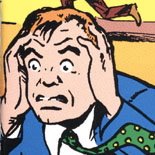The Myth of "Who's Your Daddy?"
or, "Strange Women Lying in Ponds Distributing Swords is No Basis For a System of Government. "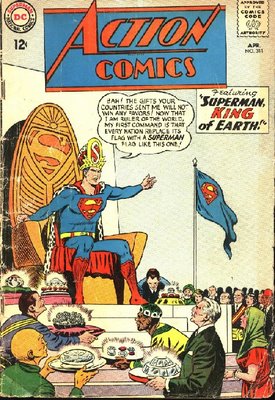 Once again, what started as a response to Matthew has grown into an entire blog post (including a little anti-Bush rhetoric and, to my surprise, praise for Infinite Crisis). In response to my last post that Superman was in fact a working class hero and his stories are anti-classist, he wrote
Once again, what started as a response to Matthew has grown into an entire blog post (including a little anti-Bush rhetoric and, to my surprise, praise for Infinite Crisis). In response to my last post that Superman was in fact a working class hero and his stories are anti-classist, he wrote
Everything you say about Superman is true. But you're talking about what Superman does, and what he thinks and believes and stuff. What I was talking about is who he technically is, and who he is is, basically, the Lost Prince of Krypton. He's like Carrot in the Discworld books.I meant to respond right away, but I couldn't tell whether our disagreement over the class of Superman was a minor semantic disagreement over the definition of the word "is" (which would be too minor to even argue) or a major philosophical one over the meaning of social class and the nature of hereditary predestination. I'm going to assume it's the second, even though there is no way to do that justice in one post of my comics blog.
This way, the Superman writers get to have it both ways. They can draw from the alien-aristocrat superhero archetype, but they don't have to make him act like it. (Contrast: Superman, and Dr. Tachyon from the Wild Cards novels.) This may actually be one reason (out of all the many reasons) why Superman is such a great character.
Matthew says that Superman, in the tradition of Oedipus, King Arthur, and Aquaman, may act as a peasant hero but he is in fact a king-in-disguise, that it is his Kryptonian genetic destiny shining through that makes him Superman. That he's a hero because of his elite genetics, no matter how much he pretends he is a commoner.
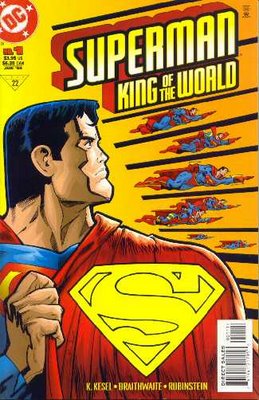 My problem with basing Superman's class on his genetics over his actions is that class is a social construct. It is only through what he and others consider him to be that we know what class he belongs to. And Superman chooses NOT to be a king (stories where Superman chooses to become a king will be ignored because they are terrible) The myth of aristocracy is that class is genetic, that some people are just born good enough to rule, and that this inherent goodness can be passed down from generation to generation (like the X-Gene!)
My problem with basing Superman's class on his genetics over his actions is that class is a social construct. It is only through what he and others consider him to be that we know what class he belongs to. And Superman chooses NOT to be a king (stories where Superman chooses to become a king will be ignored because they are terrible) The myth of aristocracy is that class is genetic, that some people are just born good enough to rule, and that this inherent goodness can be passed down from generation to generation (like the X-Gene!)And Superman's own story proves the myth false. Yes, Clark's blood obviously gives him "powers and abilities far beyond those of mortal men." However, what makes him a good guy can't be his blood, because Kryptonians are the assholes of SPAAAACE (below the comic).
Zod, Preus, the Eradicator, the new Kara Zor-El (possibly)... Those that come to Earth preaching the superiority of Krypton are by and large really, really bad guys. And even under the best of circumstances, Kryptonian society was ruled by arrogant morons who couldn't see their planet was falling apart despite the evidence of the best scientists of the time (cue Global Warming joke). So clearly, just being vulnerable to kryptonite isn't enough to make you better than the masses.
No, what makes Superman a hero is the choices he makes. And whenever Superman is forced to choose between the Kryptonian way and the Earth way, he chooses Earth, every time, and embraces his life as Clark Kent (the end of Kingdom Come, for example). And as long as Superman chooses to live as a middle-class employee, THAT is who he is. Jor-El and Lara may have given him powers, but it's Jonathan and Martha, his "humble" lower class parents, who made him a hero.
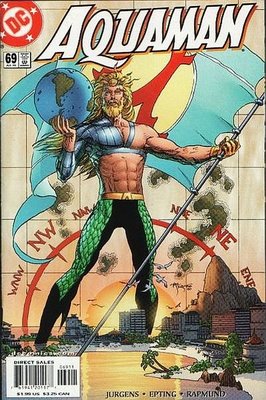 This is unlike almost every other superhero, by the way. Contrast Superman with Aquaman, for example. Like Superman, he was orphaned as a baby, raised in an alien world, and grew up as a human for at least part of his life (where he learned English and was christened Arthur Curry). But when Aquaman learned where he was really from, he rejected the surface world and threw in his loyalties to Atlantis whole-heartedly, in the more traditional Arthurian arch-type. (Ironically, to become King Arthur, he had to reject the name "Arthur.") Even given the chance, Superman would NEVER give up Earth to return to Krypton.
This is unlike almost every other superhero, by the way. Contrast Superman with Aquaman, for example. Like Superman, he was orphaned as a baby, raised in an alien world, and grew up as a human for at least part of his life (where he learned English and was christened Arthur Curry). But when Aquaman learned where he was really from, he rejected the surface world and threw in his loyalties to Atlantis whole-heartedly, in the more traditional Arthurian arch-type. (Ironically, to become King Arthur, he had to reject the name "Arthur.") Even given the chance, Superman would NEVER give up Earth to return to Krypton. Matthew brings up Carrot Ironfoundersson of the Discworld novels, another heroic king-in-disguise who refuses to take the throne. But that, I think, argues for MY point. Discworld, after all, is a satire of the myth of aristocracy (among many other things). Most of the other characters think Carrot should rule because of his unacknowledged heritage, but those that think that way are idiots and bad guys.
Matthew brings up Carrot Ironfoundersson of the Discworld novels, another heroic king-in-disguise who refuses to take the throne. But that, I think, argues for MY point. Discworld, after all, is a satire of the myth of aristocracy (among many other things). Most of the other characters think Carrot should rule because of his unacknowledged heritage, but those that think that way are idiots and bad guys.The smarter characters, including Carrot himself, know he's not smart enough to run the city, nor ruthless enough to do half the horrible things he'd need to as King (or Patrician, as the position is called). That having the right name and the right daddy isn't enough, that "the right blood" is in fact close to meaningless (I'd make another joke here...). Carrot may be related to a king, but day to day it's much more important that he learned how to be good man (or dwarf, it's complicated) and can throw a strong right hook.
Carrot, of course, is a deliberate satire, and I doubt Siegel and Shuster were thinking too deeply about Jungian arch-types and Marxist rhetoric when they created their science fiction strong man, but I think Superman is a stronger character because of it. Carrot can really only be that satire: "King Arthur, but not," stuck in an old debate over the divine right of kings and dictators. Superman can be that satire and more, moving beyond that class discussion to a classless society where a man is judged only by his actions.
Which leads me to my defense of Infinite Crisis. I dropped Civil War when I realized it wasn't about anything. And while Infinite Crisis was flawed, I can tell you what it was about: the myth of heroic destiny. Superboy-Prime (and to some extent Alexander Luthor) believed he had the right, the duty, to destroy the universe and remake it in his image because of who his Kryptonian parents were, and that he would ALWAYS be in the right, always be the hero because his name was Kal-El, he was from Krypton, and he had great power. He was wrong. In the end it came down to Superman, our Superman, laying it out for him:
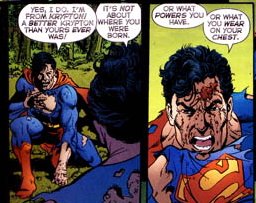
And, after laying Prime out, Clark lets him know what it's all about:
What makes Clark Kent "Superman," and not just another asshole Kryptonian, is his actions. So when judging what class Superman belongs to, whether he's an elite looking down on the masses or one of us, we can only judge him based on "what Superman does, and what he thinks and believes and stuff." Because what else is Superman, in the end, other than those things?


